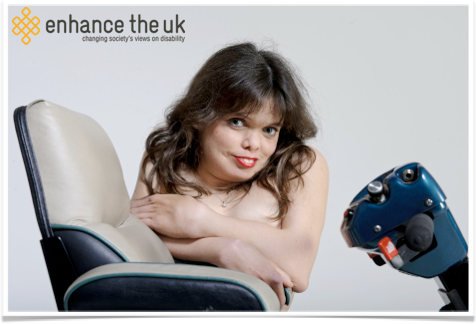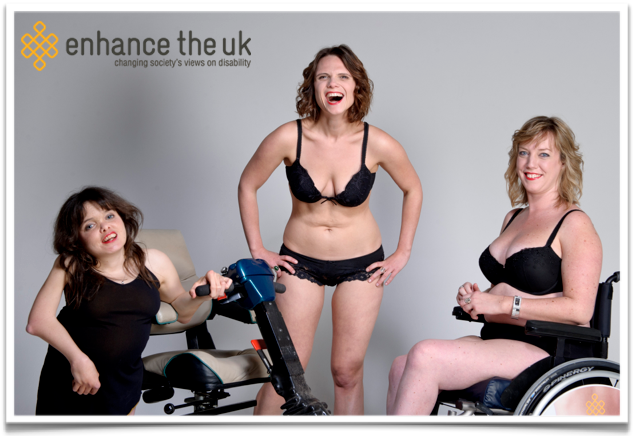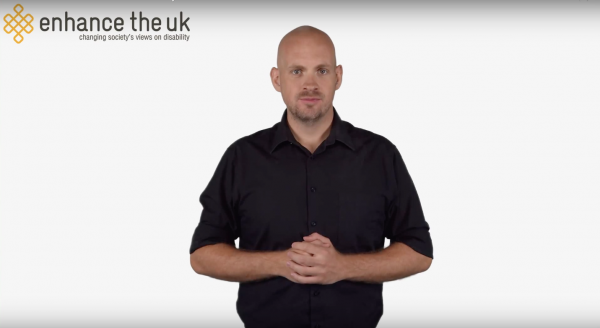We answer your questions about Sex & Disability
We get a lot of questions about sex and disability. Enhance The UK want to get more and more people talking about it too so that it becomes normalised, so we’re sharing a bunch of questions we’ve had with you to get the ball rolling. Have you got a question of your own? Then get in touch and ask us!
Can very small people have sex? Nick Ton, New York
Most very small people have Achondroplasia, which is when the legs and arms are very short, but the rest, including the genitals, is average sized.
If a woman is very small all over, don’t worry, the penis will fit inside! After all, the vagina is designed to stretch enough for a baby to go through. The important thing is to relax and enjoy yourselves, whether or not you have penetrative sex.
Can disabled people have sex? Christian Mckenzie, Glasgow
Yes! Sex can involve kissing, touching, oral sex and penetrative sex, both vaginal and anal – but sex is a very personal thing and can be anything that makes you feel good.

Can disabled people be gay? Anita Willis, Cork
Yes – your disability does not affect your sexuality. You can be disabled and gay, lesbian, straight, bisexual or transgender.
If my partner is disabled – can I still have children? Megan Price, Aberdeen
Most disabled people can have children like anybody else. Many disabilities do not get passed on to their children, but if you are worried about this, doctors can advise on ways to minimise the risk. If a disabled woman can’t carry a baby because of the risk to her health, options include adoption and surrogacy.
What would happen if I tried to have sex and it went wrong? Will Foster, Sydney
Many men, disabled or not, experience erection problems. Many women experience painful sex, or vaginismus, whether they are disabled or not. Don’t assume that any problems are due to your disability. Your doctor will be able to help, or you can contact Brook. In the meantime, sex is not all about penetration, so relax, the important thing is to enjoy yourselves!

Is it ok to masturbate? Mamoon Dann, Manchester
Yes – masturbation is a good way of exploring what parts of your body are pleasurable to touch. If you find it physically difficult to masturbate or get in the right positions to have sex, try looking at www.spokz.co.uk to see the sex aids that are available.
Is it normal for disabled people go out with other disabled people? Craig James, Sheffield
Like everyone else, a disabled person will want to go out with someone who has the same interests and attitudes as him or herself, whether they are disabled or not. Many disabled people don’t even know many other disabled people, and even if they did, they may not have the same disability as them anyway, let alone having anything else in common.
In the same way, if you’re able-bodied, you may well find you have more in common with a person who has a disability than with another able-bodied person.
What’s it like going out with a disabled person? Lisa Godfrey, Newcastle
It’s pretty much the same as going out with anyone else. Some people with a disability want casual relationships, others want a more long-term partner. Whether you yourself are disabled or not, sometimes it takes a little while to get used to being around someone else who looks different, or has mobility or communication difficulties, but you will probably get used to this surprisingly quickly.
What will people think of me if I go out with someone with a disability? Luke Gadd, Dublin
Obviously many disabled people are more attractive, healthier, more intelligent and generally nicer than many able-bodied people who manage to find partners. It is up to you whether you will allow other people’s prejudices to influence who you go out with, and possibly prevent you from finding a really great partner.
If I go out with someone with a disability, wouldn’t I have to be a really caring person? Zara Thomas, Miami
Young people who need help with everyday activities are normally assisted by their family. As they grow older and more independent, disabled people can employ personal assistants (carers) to help them remain independent. So if you meet someone who has a disability which means they need care, it is very unlikely they have been waiting for you to come along to be their carer!

What is a physical disability? Kate Radish, London
If someone has a physical disability it means part of their body does not function in the way most people’s do. This may mean they have to do daily activities differently – for example some people use a wheelchair to get around.
Anyone can become disabled. The vast majority of those born with a disability have both parents who are able-bodied. Some people are born with a disability – after all, everyone is born different, it’s just some are more different than others! Some people develop a disability later in life, or may never have fully recovered after an illness or accident. Some disabilities are visible, others are “hidden.” For example if someone has brittle bones, they may look like anyone else, but they may not be able to play certain sports because of the high risk of breaking a bone.
Some disabilities are straightforward, such as having a limb missing, or being blind. Others are more complex, with a variety of symptoms. Cerebral Palsy can cause many different symptoms for example, including a lack of co-ordination or spasms.
Some disabilities cause communication difficulties. Some people can’t hear clearly. Others may have unclear speech, or need more time to reply, due to nerve damage. You should never assume someone who has speech difficulties is deaf or has a learning disability.
Although many disabilities are hard work to live with, because everything physically takes more effort, for most disabled people half of the problem is how other people view them. Most disabled people are perfectly happy with how they are, they just wish the rest of the world would accept them the way they are.
Is there more risk of getting an STI from a disabled person? Matt Wright, Perth
Whoever you have sex with, it’s vital to use protection to prevent sexually transmitted diseases or pregnancy.

